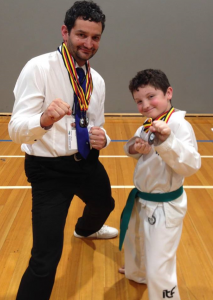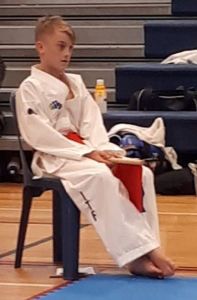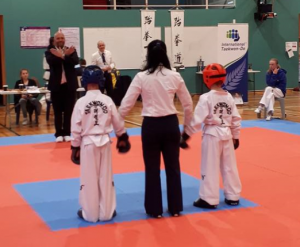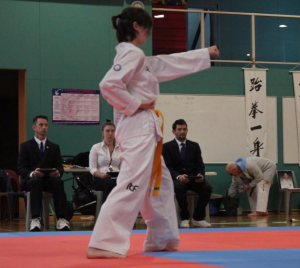Simon Jarvis. 4th Gup, RTR Taradale Club

Last year, my family and I started to compete and help out at TKD tournaments, and I became curious about taking up a role as an official. For me it was a natural progression to want to do so, because I have always volunteered my time to refereeing in all of the sports I have competed at, including rugby, touch rugby, cricket, squash, indoor cricket and netball. For the most part I went on umpiring / refereeing courses as it’s such an important role; I wanted to give myself the tools and knowledge to ensure the competitors aren’t adversely affected by any mistakes or judgement calls that would come about through a lack of preparation on my part.
I have made many dubious judgement calls when officiating at these sports, as have all officials, but if we turn those into learning experiences then we develop and grow just as we would as competitors. This fear of making mistakes is probably the biggest reason why all sports experience difficulties in getting referees and officials, so I am encouraging everybody to show your indomitable spirit and conquer that fear.
No officials means no competition, and from what I have seen so far, the TKD community is experiencing good growth in competitors (both the Counties Manukau and Midlands Regional Championship Tournaments broke records for attendance this year) but is immensely shy of officials to keep up with this growth.
I saw last year’s Counties Manukau umpiring course cancelled due to insufficient numbers, which is really sad considering 240 competitors attended their Regional Tournament this year. It would be a real injustice if future tournaments were jeopardized due to a lack of officials. It’s great to see Lion Nathan sponsoring the officials heading down to the South Island Regional Championships on the 12th of May, but that is evidence in itself that TKD desperately needs more officials throughout the country.
This then, is good reason to don the white shoes, white shirt, navy suit and navy ITF tie (ladies uniforms are always looking super smart and professional as well). It is also a great opportunity for competitors to get insight into what the judges and umpires are specifically looking for, so they can develop as a competitor.
The Central Regions TKD umpiring course was run brilliantly and I especially loved the way center refereeing practical lessons were incorporated at random times throughout the day, to get the blood flowing.

We have been fortunate in the Central Region because we have had a few of the younger students take up officiating. They did such an awesome job of it at this year’s U18 tournament in Palmerston North that they were internationally recognized for their efforts, and rightly so. If these awesome 10 and 11 year-olds can do it, then us big kids should have no problems for sure.
Let’s not forget the important role of non-TKD parents and supporters attending tournaments, who also help out unofficially. There has been a drive to get these wonderful people through courses, because there are many aspects of officiating that can be achieved without the need to be a registered practitioner of the martial art itself. This includes marshalling, judging and center refereeing in sparring competitions, and assisting in the specialty and power rings, along with a whole host of other important administration and logistical roles. My wife attended the Central Region umpires course last year, thoroughly enjoyed it, and is really looking forward to any opportunity to officially help out beyond her usual dedication towards helping out the RTR team at the tournaments we have attended.
Everybody who has attended a TKD tournament as a competitor or supporter will attest to how exciting the action is. Some tournaments allow supporters to be ring side, while others have to abide by rules, limiting ring-side support to competitors and coaches, with everybody else in the grandstands away from where all of the real action is occurring. Being an official means you are guaranteed to be where all this action is taking place, and believe me it is far more exciting than watching it from a distance.
Maybe, to keep up with the demand for officials, the organization could review the guidelines in terms of pre-requisites for attending an umpires course. Currently it is part of the grading syllabus to achieve a 2nd dan black belt, but making it a pre-requisite at an earlier stage of a person’s career could boost numbers. It is understood that, in order to judge a pattern, you really need to have personally practiced that pattern. With multiple rings there usually is a split in ranks, i.e at the Midland’s tournament it was Green belts and below on Ring 2, which meant they could potentially be judged by blue belts and above. A review, to see if it’s viable as a pre-requisite to gaining a 1st Dan black belt, could be a good first step.
My first experience as an official was at this year’s Under 18 Tournament in Palmerston North, and it was so awesome to see the best Minikids to Juniors in the country competing and having fun. Was I nervous, given it was my first time as an official? Most definitely! However, I was put at ease by all of the other officials attending because they were all supportive of each other, and constantly coaching and mentoring the “baby officials”.
The highlight for me at this tournament was being given the opportunity to do some center refereeing in the sparring competition. This was by no means an easy task, but an extremely important one as I will elude to later in the article. As a competitor I can tell you that center refereeing gets the adrenaline pumping in a similar way to competing, because you are so close to the action. I made plenty of mistakes in terms of using the correct hand signals, but it wasn’t detrimental to the competitors and didn’t have an impact on the spectacle of the matches, so I was happy with my first-time appearances. Thank you to all of the more experienced officials, who’s guidance during the sparring session was well received and appreciated. I thoroughly enjoyed the day, and highly recommend it to anyone considering it.

My second experience as an official was at this year’s Counties Manukau Regional Championship Tournament in Papakura. The brand new venue, and sheer numbers of competitors were mind blowing, so it was great to have the opportunity to see how a big tournament is run from an official’s perspective as opposed to a competitor’s perspective. Once again it was professionally run, and you could see all of the hard work and dedication put in by the organisers to make it successful. I was an official at the specialty (flying techniques) ring for the entire day (ended up being a massive day as I drove back to Napier afterwards), and it was a privilege to see the awesome talent throughout that competition. The junior black belts were particularly impressive, but it was the veteran black belts that personally inspired me as they were reaching phenomenal heights where us “dear ol’ dads aren’t supposed to be capable of. Their hard work and dedication over many years’ means they are still able to perform close to their peak performances that they were producing in their younger years, so it was awesome to bear witness to that.

I’m becoming more confident in terms of officiating with each tournament. I got my first opportunity to officiate and compete at the Midland’s Regional Championship in Gisborne recently. Once again, an awesome experience but I did feel a bit like Clarke Kent making quick dashes to change from umpires uniform into dobok and vice versa (4 times as I was entered in 4 events).
Luckily, I once again had an awesome support crew with 4 RTR team members stepping in to officiate while I was competing. Having good support is key to successfully being able to compete and officiate at a tournament. The highlight was standing on a very high box and holding a paddle over my head for a spectacular session of junior green belt high kick competition, where the eventual winners were flying to World Championship level heights (2.4m). A personal competitive highlight was achieving my first medal in a power competition with a very sweet knife hand break and awesome turning kick break.
I would encourage all competitors to get involved and become an official, I had a great time doing it although be aware marshalls may not be overly impressed if your name is called out and you are still in your umpire’s uniform.
I alluded to the importance of all official’s roles during the sparring competition, and the most important part is ensuring competitors are safe, minimizing the chances of serious injury. Taekwon-Do is a points-fighting discipline, which means it’s not a sport like boxing or MMA in which we are trying to knock each other out. We progress from non-contact sparring to full contact sparring as we go up through the age groups and grades, so it is vitally important to the growth and development of TKD that the competitor’s safety and wellbeing are at the forefront of any decision made by the officials.
Studies show brain injuries can have lifelong effects, particularly by those who may sustain an injury under the age of 12. It is for this reason that a lot of parents feel uneasy about their children participating in full contact sports (the number of kids playing tackle rugby is declining) so there has to be an element of proper control within a sparring ring, otherwise the risk of injury is heightened significantly.
Studies also show there are very few head trauma injuries sustained in Taekwon-Do sparring matches, especially compared to American football, rugby and league. In fact there are far more in non-contact sports such as soccer, basketball, netball and hockey which tend to be even worse because the contact is unexpected.
This doesn’t mean that it does not happen, and the statistics may be different if there was proper reporting of incidents. As a junior gup adult with very little experience, I hadn’t learnt proper control so I inflicted two head injuries on opponents. I myself have been slightly concussed on two occasions and I have been witness to two other more severe concussions suffered by TKD participants in the past 12 months, one in the junior division and one in the senior division. This highlights the importance of staying vigilant in this area. Interestingly, one of the more serious concussions resulted in a disqualification for excessive force, and the other was deemed to have been unintentional with no disqualification.
It’s not easy, whether you are brand new or experienced, to maintain proper control; sometimes the contact is powerful, either accidentally or intentionally. I have seen sparring matches between students as young as eight years old where the contact has become out of control and you can tell from the sideline, usually from the look in the child’s eyes, whether heavy contact is intentional or not. However, as a center referee who needs to keep an eye on all aspects of the bout, it can be really difficult to properly gauge the amount of force and the intent, even though it’s happening right in front of you. Some will say heavy contact is a great way to toughen the kids up, but I believe it becomes a big deterrent for some children and their parents, which may be why there are not huge numbers of kids that participate in sparring events when compared with the numbers at weekly trainings throughout the country.
This is an area in which all officials can make a huge difference to how the sport is perceived in the public eye, and encourage the youngsters to show off their techniques when sparring, as opposed to their power. Warnings, fouls and disqualifications play a big part in educating all concerned about what points fighting is all about – using Taekwon-Do techniques on a moving target.
How to react to an attack with defensive techniques is just as important, and if judges are trained to identify this, as opposed to only scoring attacks, then we will get better results for those that are talented at Taekwon-Do, as opposed to those that can demonstrate power. Breaking boards as opposed to heads is, in my eyes, a much better representation of a person’s strength and power.
Sparring should give everybody a platform to show off other techniques that we learn based on core fundamentals like self-control, perseverance, and indomitable spirit, in a safe environment where it’s fun to do so. I personally really enjoy sparring competitions and I’m hoping I can do justice to other competitors by officiating to the best of my ability as well.
Have I inspired you to get involved as an official? Below are some contacts to get you there, but making enquiries with any of your senior instructors should suffice, as they will point you in the right direction.
Photos by Simone Dunkerley
